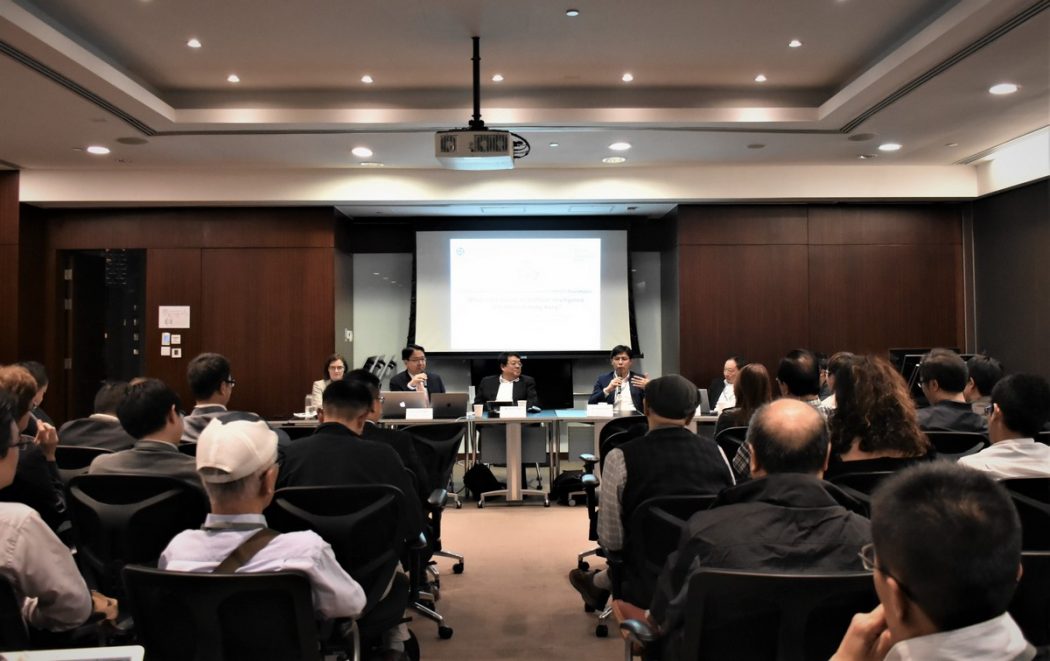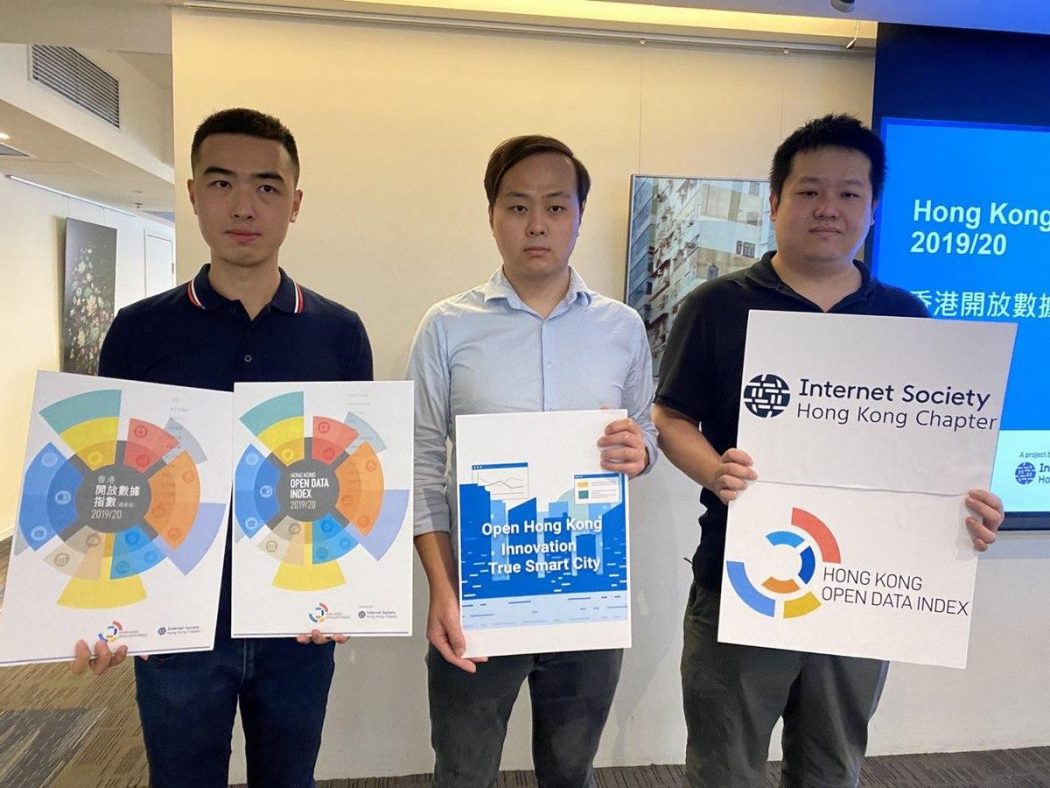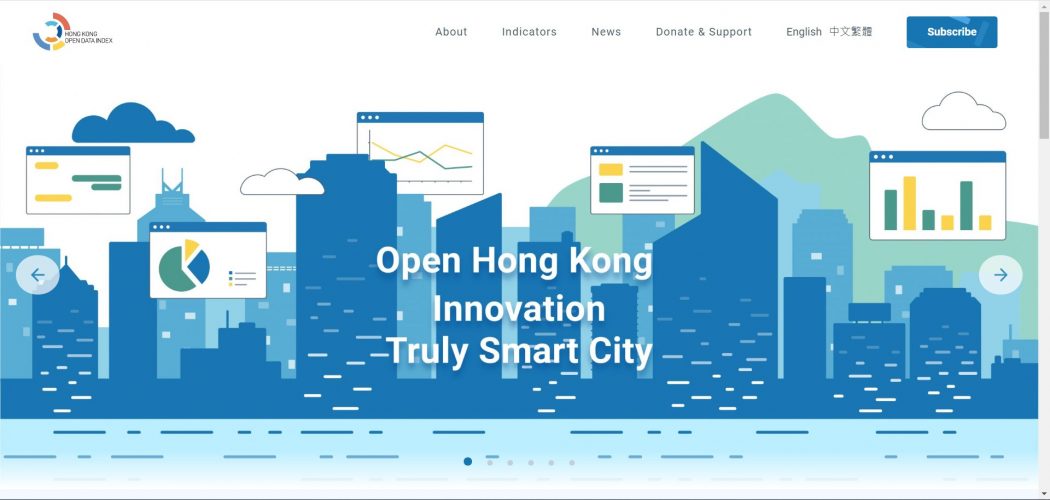In partnership with the Hong Kong Open Data Index
In 2017, the Hong Kong government unveiled a sweeping ‘Smart City Blueprint’ that would build the SAR into a “world-class” smart city; one that would embrace innovation and technology to “address urban challenges” and make people “happier, healthier and more prosperous.”
Smart cities demand open data as a raw material for innovation. But the government’s open data portal (data.gov.hk) is still failing to meet international open data standards, according to the findings of the first Hong Kong Open Data Index, published this month.

Developed by Internet Society Hong Kong with support from WYNG Foundation, the Hong Kong Open Data Index 2019/20 is the first analysis of its kind into the city’s open data landscape.
The government’s open data policy has grown more strategic since the Blueprint was published. The Steering Committee on Innovation and Technology, chaired by Carrie Lam, firmed a new open data policy in October 2018 that oversaw the release of over 650 new datasets, bringing the total currently published on the data.gov.hk portal to 4,080.
Despite these efforts, the Index finds that the data.gov.hk portal is still not significantly any more ‘open’ than comparable public websites, such as those run by NGOs or private companies. The authors highlight how individual government departments apply inconsistent standards to their datasets, potentially causing confusion or copyright implications for users.
What is open data?
Open data is data that can be freely used, shared, and built upon by anybody for any purpose. Good-quality open data is a tool that drives civic innovation, aids research, promotes business development and stimulates technological advances. One of the most robust policies in the world is the ‘Open Data Law’ in New York City, which mandates all public data be published on a single web portal.

“Open data can also improve government transparency and help citizens hold their leaders to account,” says Benjamin Zhou, internet policy researcher at ISOC HK and author of the Index. “For example, in recent months, there have been a lot of online campaigns and social media interactions about the datasets of the Hong Kong Police Force, as well as datasets about the coronavirus. People use this information to inform their daily activity.”
After Hong Kong’s first case of Covid-19 was confirmed on January 23, it took a team of volunteer developers and open data advocates just two days to create the “Covid-19 in HK” platform (wars.vote4.hk). The open-source site has been collating open data from government sources such as the Centre for Health Protection, combining it with updates from social media and the press. Features include a list of live wait-times for different A&E departments, an interactive map of “high-risk” areas, and details of “dubious” profiteering pharmacies.
“In the future after the virus is gone, people might want to study the information [on the site] to find out how we can do a better job in terms of handling viruses,” points out Ho Wa Wong, a data activist who worked on wars.vote4.hk.
Wong, who is the convener of advocacy platform g0vhk.io and sits on the advisory committee for the Open Data Index, adds that the government’s tight-lipped approach to the controversial rollout of “smart” lampposts in the city is an example of how mistrust can build without proper public consultation on data.

“Without proper transparency, you can’t see which departments or people are getting the pedestrian and traffic data. In this atmosphere with the tension between the government and the citizens, if you can’t tell me how long a CCTV video will be retained, that is pretty scary,” he says. “It’s not just about the technology, it’s about the consultation. The consultation [on the lampposts] was very close-lipped, and they tried to keep it low-profile. They ended up having an internal committee. How can you tell the citizens it’s safe without a more collaborative culture?”
Critical gaps in datasets
Not all open data is equally open. The quality of open data can be vastly improved by a suite of technical factors, including allowing bulk download, creating permanent archives, including comprehensive metadata, and the provision of an API (Application Programming Interface), which makes it possible for programmers to automate the data access process.
The Index, which was based on established international open data standards, used 12 such indicators across 16 categories, covering 69 types of dataset, to evaluate data in Hong Kong.
While some government departments, notably the Census and Statistics Department and Legislative Council, perform well for openness on the Index, the report identifies critical gaps in datasets relating to five particular areas: land, business registration, security and justice, housing, and government operations.

Missing datasets of note include those relating to business and land ownership, public housing (including waiting time and allocation status), the government’s calls for tender and contact points, and travel alerts.
“The whole e-government system in Hong Kong is not well built,” says Zhou. “For an average person looking for some information, the datasets are not integrated at all – the flow is not user-friendly.”
Pushing for more public consultation
The Index’s authors are now urging the government to set up a public consultation programme to help improve open data policies and practices.

“Taipei and Shanghai have already set up forums to collect public opinion on the datasets in their open data portals in recent years,” Zhou says. “It’s pretty much what you could call a democratic process. In Hong Kong, the government has set the open data policy, but they made the plan on their own. We don’t know who they consulted; we don’t know if they will release data relating to what the public is concerned about, or if they’ll just throw out what is handy.”
In the wake of the report’s launch, Zhou says the ISOC HK advisory committee is arranging workshops and webinars to discuss the issues with stakeholders and establish how to “push” the government on the subject. The report comes ahead of the ‘Smart City Blueprint 2.0’, details of which will be announced by the government later this year.
Zhou and Shek add they both wish to see open data improved in the district councils. “District councils have particular issues with open data,” says Sherry Shek, project coordinator at ISOC HK for the Open Data Index. “For example, different district councils publish financial data in different formats or don’t upload in Excel. So we can’t monitor the affairs in our neighbourhood.” Other issues include incomplete records of meetings, and records of voting results not being published in a machine-readable format.

“In general, the datasets of the district councils are much worse than the legislative council,” says Zhou. “Even the district councils agree there’s a lot of work needed to increase transparency.”
Steps in the right direction
When asked about the findings of the Index, the Office of the Government Chief Information Officer (OGCIO) offered a statement to Hong Kong Free Press:
“Since the government implemented a new policy on opening up data in October 2018, government bureaus and departments have been actively releasing more data on the data.gov.hk portal and enhancing the usability of data. Datasets of real-time estimated arrival times of New World First Bus, Citybus, New Lantao Bus and the MTR have also been released by the companies for use as raw materials for innovation.

“The government welcomes feedback from the community on the implementation and types of data to be opened up. We review our feedback mechanism from time to time and will provide more channels to gather public views when necessary.
“The OGCIO will study the Hong Kong Open Data Index and learn more about the assessment method and mechanism from the ISOC HK to keep enhancing the opening up of government data, thereby driving the development of the smart city.”
On its own website, OGCIO describes Hong Kong as “Asia’s leading digital city”. Wong chuckles in disbelief when asked if he agrees with this vision.
“We’re not just talking about open data, but at this point, it’s not even about the comparisons with Taiwan or Singapore, because we’re so far behind you don’t need to compare,” he says. Referring to an outdated software that is regarded as a security risk, he adds: “I mean – some of the government websites still use Adobe Flash.”

Wong agrees the government has taken steps in the right direction since 2018. “We have to be fair to the government – they have made some progress, and the OGCIO has opened up data in some areas,” Wong concludes. “But I think the significance of the Open Data Index is to highlight the places where they need to improve. Yes, they’re doing something, but they need to do a lot more.”
